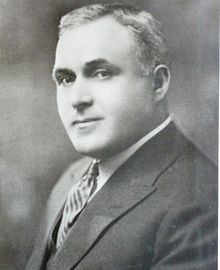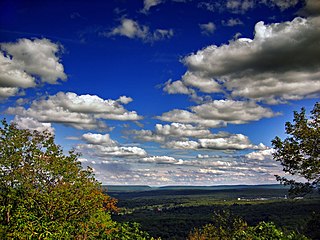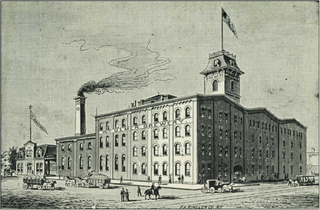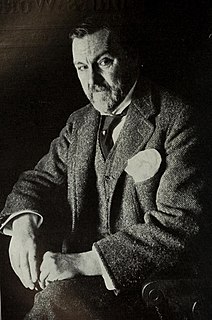Samuel Rubel | |
|---|---|
 Samuel Rubel | |
| Born | 1881 Latvia |
| Died | April 29, 1949 USA |
| Nationality | Latvian |
| Occupation | Coal Miner & Ice Retailer |
Samuel Rubel (1881-1949) was an American millionaire immigrant from Russia.
Samuel Rubel | |
|---|---|
 Samuel Rubel | |
| Born | 1881 Latvia |
| Died | April 29, 1949 USA |
| Nationality | Latvian |
| Occupation | Coal Miner & Ice Retailer |
Samuel Rubel (1881-1949) was an American millionaire immigrant from Russia.
In the 1920 U. S. Census his occupation was described as "Coal Miner & Ice Retailer." Rubel emigrated to America in 1904 from Riga, Latvia, at the age of 23. Rubel started his career selling coal and ice with a horse-drawn wagon in the tenements in the East New York section of Brooklyn.
Rubel became the head of the Pocono Mountain Ice Company based in Hoboken, New Jersey, which became the leading ice company in the Pennsylvania and New Jersey area, buying up many of the smaller ice companies. Beginning in the 1930s with the advent of refrigeration, the harvesting of the ice from lakes became less and less profitable. Eventually, the ice companies folded, and Rubel switched his focus to other fields (such as brewing).
In 1946, Rubel's mansion in Roslyn, New York was destroyed by fire. [1]
Rubel died on April 29, 1949. He was president of the Ebling Brewing Company at the time of his death and his net worth was estimated at $8,000,000.
Rubel was a supporter of the Boy Scouts of America. Samuel Rubel donated a large tract of land around Stillwater Lake in Pocono Summit, PA to the Bethlehem Area Council; the land was presented to the Scouts on May 27, 1949. [2] [3] The land, which is now known as Camp Minsi, is still in use by the Boy Scouts today. [4]
Samuel Rubel married Dora Nachumowitz; the couple had two daughters. [5]

Obituary from the New York Times (April 30, 1949): [5]
The career of Samuel Rubel verged on the fabulous... His first route was the north side of Watkins Street, in the East New York section. He covered it with a horse and wagon... Up the tenement stoops Mr. Rubel personally carried his cakes of ice and bags of coal. His next move was to a coal platform, with an office on Pitkin Avenue. 'That year I started selling to other peddlers,' he said later... In 1925 he bought the majority stock of the Ice Service Corporation and also two other firms... Two years later his firm was merged with the Commonwealth Fuel Company and the Putnam Coal and Ice Company. The new concern, the Rubel Corporation, of which he became head, then had thirty-five coal pickets, forty ice factories and fifty coal and ice stations in the greater city. The same year Mr. Rubel bought the Ebling Brewery then in trouble with prohibition authorities for the manufacture and sale of beer. He planned to convert it into an ice-cream factory.

Labatt Brewing Company Limited is a Belgian-owned brewery headquartered in Toronto, Ontario, Canada. Founded in 1847, Labatt is the largest brewer in Canada.

Scouting in Pennsylvania has a long and rich tradition, from 1908 to the present day, serving thousands of youth in programs that suit the environment in which they live.

The Delaware Water Gap is a water gap on the border of the U.S. states of New Jersey and Pennsylvania where the Delaware River cuts through a large ridge of the Appalachian Mountains. The gap constitutes the southern portion of the Delaware Water Gap National Recreation Area, which is used primarily for recreational purposes, such as rafting, canoeing, swimming, fishing, hiking, and rock climbing.

The Pocono Mountains, commonly referred to as the Poconos, are a geographical, geological, and cultural region in Northeastern Pennsylvania, United States. The Poconos are an upland of the larger Allegheny Plateau. Forming a 2,400-square-mile (6,200 km2) escarpment overlooking the Delaware River and Delaware Water Gap to the east, the mountains are bordered on the north by Lake Wallenpaupack, on the west by the Wyoming Valley and the Coal Region, and to the south by the Lehigh Valley. The name comes from the Munsee word Pokawachne, which means "Creek Between Two Hills." Much of the Poconos region lies within the Greater New York-Newark, NY-NJ-CT-PA Combined Statistical Area. The wooded hills and valleys have long been a popular recreation area, accessible within a two-hour drive to millions of metropolitan area residents, with many communities having resort hotels with fishing, hunting, skiing, and other sports facilities.

The Iron City Brewing Company is a beer company that until August 2009 was located in the Lawrenceville neighborhood of Pittsburgh, Pennsylvania, United States. On June 11, 2009, it was reported that the brewery was moving their production to Latrobe, Pennsylvania. That move was completed and Iron City is now produced in the former Latrobe Brewery that was once used to produce Rolling Rock.

American pale ale (APA) is a style of pale ale developed in the United States around 1980.

Minsi Trails Council is a council of the Boy Scouts of America that serves Scouts of eastern Pennsylvania's Lehigh Valley and Pocono regions as well as parts of western New Jersey. The council serves five counties in Pennsylvania: Lehigh, Northampton, Monroe, Carbon, Luzerne, and Warren county in New Jersey.

Stillwater Lake is a reservoir that covers approximately 315 acres (1.27 km2). The lake is located in Pocono Summit, Pennsylvania at an elevation of 1,811 feet (552 m). Fed by Dotter's Run, Hawkeye Run, Pocono Summit Creek, and several underground springs, the lake flows out to Lake Naomi via Tunkhannock Creek. There are several Tunkhannock Creeks in the Poconos. This one merges with the Tobyhanna at Pocono Lake. The Tobyhanna flows into the Lehigh, and ultimately into Delaware Bay.

The Budweiser Clydesdales are a group of Clydesdale horses used for promotions and commercials by the Anheuser-Busch Brewing Company. There are several "hitches" or teams of horses, that travel around the United States and other countries that remain in their official homes at the company headquarters at the Anheuser-Busch brewery complex in St. Louis, Missouri, or at Merrimack, New Hampshire. At St. Louis, they are housed in a historic brick and stained-glass stable built in 1885. There are eight horses driven at any one time, but ten horses are on each team to provide alternates for the hitch when needed. Assorted Clydesdales are also used as animal actors in television commercials for Budweiser beer, particularly in Super Bowl ads.
Jerold Charles Hoffberger was an American businessman. He was president of the National Brewing Company from 1946 to 1973. He was also part-owner of the Baltimore Orioles of the American League from 1954 to 1965, and majority owner from 1965 to 1979.

The William Ulmer Brewery is a brewery complex in Bushwick, Brooklyn, New York City. It consists of four buildings—an office, a brew house, an engine–machine house, and a stable–storage house—all constructed between 1872 and 1890 in the German round-arch style. The site is bounded by Belvidere Street to the southeast, Beaver Street to the northeast, and Locust Street to the northwest, with the address 31 Belvidere Street. The main brew house, the engine–machine house, and the office building were designed by Brooklyn architect Theobald Engelhardt, while the stable–storage house was designed by Frederick Wunder.
The Mink Building is a five-story German-American style red brick structure at 1361-1369 Amsterdam Avenue between 126th and 128th Streets, in the Manhattanville neighborhood of Manhattan, New York City, originally part of a large brewery complex. It is one of a few buildings that remain of a vast beer brewing industry in this area in the late 19th century, beer brewing was an industry as big as finance or real estate in the 21st century New York City. The site of the complex at 1361 Amsterdam Avenue in Manhattan - predating residential development in Harlem - was chosen due to its relative isolation at the time.
F. & M. Schaefer Brewing Company was a Manhattan brewing company.

The Ebling Brewing Company, founded in 1868, was a brewery located in the South Bronx when German was the second language to English there. The company advertised their technique of aging their beer in "natural rock caves." These caves were dug into a hill behind its headquarters under the brewery in the Bronx. The Ebling Brewing Company suffered under the laws of Prohibition. In 1925 it was required to padlock its doors for four months and pay a $250,000 fine after it was found to have two truckloads of beer that had higher than the legal alcohol content, i.e.: they were found to be possessing "real beer." The 72-year old president of the company at the time was William Ebling. In 1949, the company was affected by the 1949 New York City brewery strike. The company finally closed its doors for good that decade. The Ebling Brewing Company headquarters were razed and a parking lot was created over the site. The caves, sometimes as large as 20' x 100', were covered and forgotten by most people.

Robert Weeks DeForest (1848–1931) was an American lawyer, financier, and philanthropist.
The 1953 Milwaukee brewery strike was a labor strike that involved approximately 7,100 workers at six breweries in Milwaukee, Wisconsin, United States. The strike began on May 14 of that year after the Brewery Workers Local 9 and an employers' organization representing six Milwaukee-based brewing companies failed to agree to new labor contracts. These contracts would have increased the workers' wages and decreased their working hours, making them more comparable to the labor contracts of brewery workers elsewhere in the country. The strike ended in late July, after the Valentin Blatz Brewing Company broke with the other breweries and began negotiating with the union. The other companies soon followed suit and the strike officially ended on July 29, with union members voting to accept new contracts that addressed many of their initial concerns.

The Coors strike and boycott refers to a series of boycotts and strike action against the Coors Brewing Company. The boycott, initially local in nature, started in the late 1960s and continued through the 1970s, coinciding with a labor strike that happened at the company's brewery in 1977. The strike ended the following year in failure for the union, which was forced to dissolve. The boycott, however, lasted until the mid-1980s, when it was more or less ended.
The 1949 New York City brewery strike was a labor strike involving approximately 7,000 brewery workers from New York City. The strike began on April 1 of that year after a labor contract between 7 local unions of the Brewery Workers Union and the Brewers Board of Trade expired without a replacement. The primary issue was over the number of workers on board delivery trucks, with the union wanting two workers per truck as opposed to the companies' standard one person per truck. Additional issues regarded higher wages and reduced working hours for the union members, among other minor issues.
Dean Alvord was an American real estate developer, college professor, and philanthropist known for his real estate developments in the New York City Metropolitan Area and in Florida. He was a relative of both Johnathan Edwards and Aaron Burr.
Oakdene was a Gold Coast-era estate in Roslyn, on Long Island, in New York.